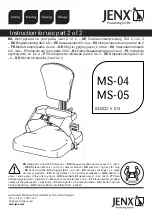
16
EASY 200-300,
ENGLISH
Footboard lock
The footplate locks in
automatically when flipped down.
To flip it up the release knob (1)
must be pulled. To keep the
unlocked position turn knob 1
when it is pulled (Fig. 5.13).
WARNING!
Always make sure to unlock the
system to get full functionality!
Footplates (Fig. 5.11)
There are two types of footplates:
platform and divided. They can be
flipped up to facilitate getting in
and get ting out of your wheelchair.
Lower Leg Length
By removing the setscrews (1),
the footrest can be adjusted to
fit any lower leg length. Remove
setscrews, set tubing with footrest in the desired position, and
reinsert and tighten the setscrews (see the page on torque).
Make sure that the compo site plastic pad is in the proper
position under the setscrew. A minimum interval of 25mm from
the ground should always be maintained.
Divided and Platform Footplates (Fig. 5.14 - 5.15)
Footplates can be flipped up to
facilitate getting in and getting out
of your wheelchair.
They can also be tilted to six
different angles relative to a level
surface. Tighten screw (1) firmly
on the outer side. By removing
the clips (2), the footplate can
be adjusted to three different
positions toward both the front
and rear. For this purpose, the
footplate must be flipped up.
When finished, make sure that
all screws have been properly
tightened (see the page on
torque).
A minimum interval of 25 mm
from the ground should always
be maintained.
Footplates
Compact wheel lock
Compact wheel locks are
underneath the seat sling and
are operated by pulling the wheel
locks towards the rear, in the
direction of the tyre. For the wheel
locks to operate correctly, they
must be pulled fully against the
stops, (Fig. 5.10).
CAUTION!
Incorrect mounting of the wheel lock will result in a higher effort
to operate.
Width Adjustment of the
footrests
If the footrest width needs to be
adjusted, please undo the screw
(1), set the desired width, by
positioning 1, 2 or 3 spacers (2)
from outer to the inner side and
then refit the screws, (Fig. 5.12).
1
2
Fig. 5.12
1
Fig. 5.11
Fig. 5.10
1
Fig. 5.14
Fig. 5.15
2
Fig. 5.13
1
CAUTION!
Mounting the wheel lock too close toward the wheel, will result
in a higher effort to operate. This might cause the brake lever
extension to break! Leaning on to the brake lever extension
while transfering will cause the lever to break! Splashing water
from tires might cause the wheel lock to malfunction.
















































